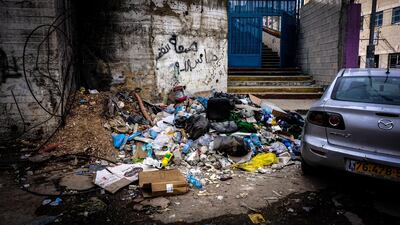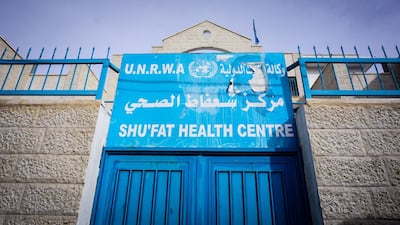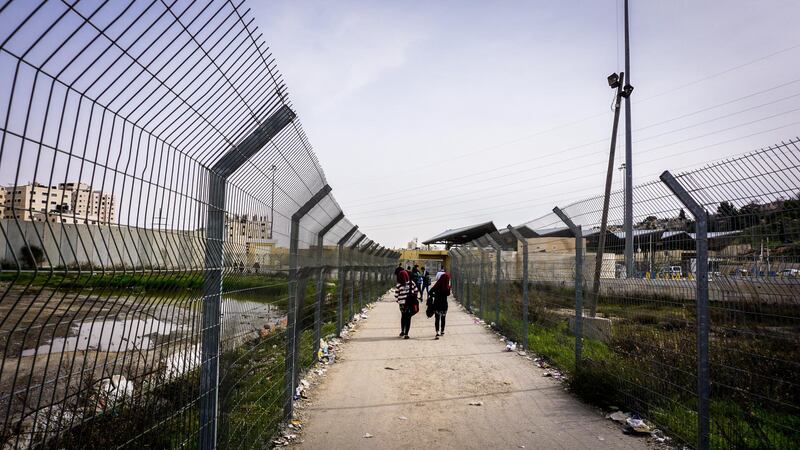Standing on the narrow thoroughfare in Shuafat Refugee Camp in East Jerusalem, where cars and trucks rattle inches past one another, a teenage boy in a black tracksuit approaches while other Palestinian men gawp at his audience: two western outsiders.
“Kabush! Kabush!” the precocious Palestinian youth shouts, uttering “occupied” in Hebrew. He points to the muddied road, then to potholes, then to a pile of rubbish. “Everything is bad! We suffer under occupation!” he yells, switching to Arabic.
The residents of this Palestinian slum that has been cut off from the city by the Israeli wall, like the teen, are eager for the world to know of their plight. They say their overcrowded town-turned-city of around 80,000 people is being pushed out of Jerusalem, the core of any future Palestinian state, and into the West Bank. They fear their future is only going to get worse.
Khader Dibs, a senior member of Shuafat’s local committee, lights what feels like his tenth cigarette of the early afternoon at his dimly lit office inside the camp. Sitting back in a red chair in a dishevelled suit, the 53-year-old puffs away, laughing infectiously as he talks.
But his manner becomes serious and unsmiling upon the delivery of two words: Donald Trump.
The US president will on Monday fulfil a campaign pledge to his conservative backers by relocating Washington’s embassy from Tel Aviv to Jerusalem, ending decades of US foreign policy. It is a decision that has angered the Palestinians and energised the Israeli right.
"The Trump decision about Jerusalem makes a hard situation for the people here," Mr Dibs said.
“When he talks about Jerusalem as the capital of Israel, it means it will finish the situation of the refugees here. The occupation will start to find a procedure to cancel this camp."
Since Mr Trump’s January 2017 inauguration, Israeli ministers have increased settlement building, declared an end to the notion of a Palestinian state, and sought to redraw Jerusalem’s boundaries. Mr Trump has also cut millions of dollars in funding to UNRWA, the UN body that helps Palestinian refugees and provides a crucial lifeline in jobs, care and education to Shuafat's residents.
But the Palestinian leadership has remained defiant, cutting all ties with the Trump administration. The residents of Shuafat, both young and old, share the same attitude.
“Trump’s decision means nothing. Why? Because he can’t control this area of the Palestinian people. We live in a prison,” said Ahmad Al Sheikh, the 48-year-old executive director of the Palestine Children’s Centre.
“If you see the American media or YouTube, you see how the American people have many jokes about Trump and his policy. So I advise Trump to take care of his internal issues, and forget about Jerusalem”.

Mr Dibs says the camp’s youth “think that Trump is foolish and crazy. He can’t force any Palestinian to agree” with his recognition of Jerusalem.
“The people discuss Trump, they say ‘who’s he to take this decision?’”
Ridden with crime, drugs and hopelessness, the encampment – what rights groups have called an Israeli social experiment – is arguably the most dangerous location in the West Bank and East Jerusalem, an area no tourist would explore in the day, let alone after dark.
Israeli authorities have stopped providing water and electricity, ended waste collection and stopped law enforcement inside the camp. Weapons are estimated to number in the thousands among residents left to fend for themselves. But the camp remains under Israeli administration, and residents pay what taxes they can to the city’s authorities without seeing much in return.
_______________
Read more:
With the Nakba, Palestinian pain is never ending
Gaza protests: Dozens of Palestinians injured by Israeli fire
_______________
Entered through a metal walkway, a checkpoint and grey, Israeli watchtower marred by the marks of Molotov cocktails, Shuafat bears all of the hallmarks of a prison. Clashes with Israeli soldiers occur on an almost daily basis. Israel dispatches undercover operatives, Jewish, Druze or Arabic, into the camp to make arrests.
With the entrance of Mr Trump on the world stage, Shuafat residents say even worse changes are already taking place on the ground.
“After Trump’s decision, there are some new things now,” said Mr Dibs.
Where Israeli police and the municipality once allowed residents to build tower blocks without permission, they are now asking residents and store-owners for proof of legal permission to build in Shuafat, and issuing demolition orders.
“If the municipality or the Israeli military manage to destroy these buildings, it means they will empty this area,” he said, fearing further displacement after many of the residents and their ancestors were forced to flee to Shuafat during the Nakba, or “catastrophe”, caused by Israel’s birth in 1948.

They suspect the Israeli moves are aimed at forcing them out to make way for settlements, which the international community considers illegal under international law. Nearby Jewish outposts are remarkably different, with fully functioning roads, services fit for a modern city and the assistance of Jerusalem authorities. That situation is slipping further from Shuafat’s grasp.
In January, Israel moved the camp from under the umbrella of the police to the jurisdiction of the military, citing security. But “that means they deal with this camp as West Bank land, not Jerusalem land,” Mr Dibs said.
It is a situation that has left Shuafat’s residents even more bereft of hope and distant from their revered holy site in Jerusalem’s Old City — the Noble Sanctuary, or Haram Al Sharif. Mr Dibs calls Israel the “51st state of the United States” because of the American and Israeli decisions. Their desperation is such that they believe only one group of people can prevent their plight deepening further.
“The American people can stop Trump,” said Mr Dibs.
But with the US presidential delegation in town for the embassy opening and Israeli celebrations under way, it may already be too late for those living in Jerusalem’s no-man’s-land.





